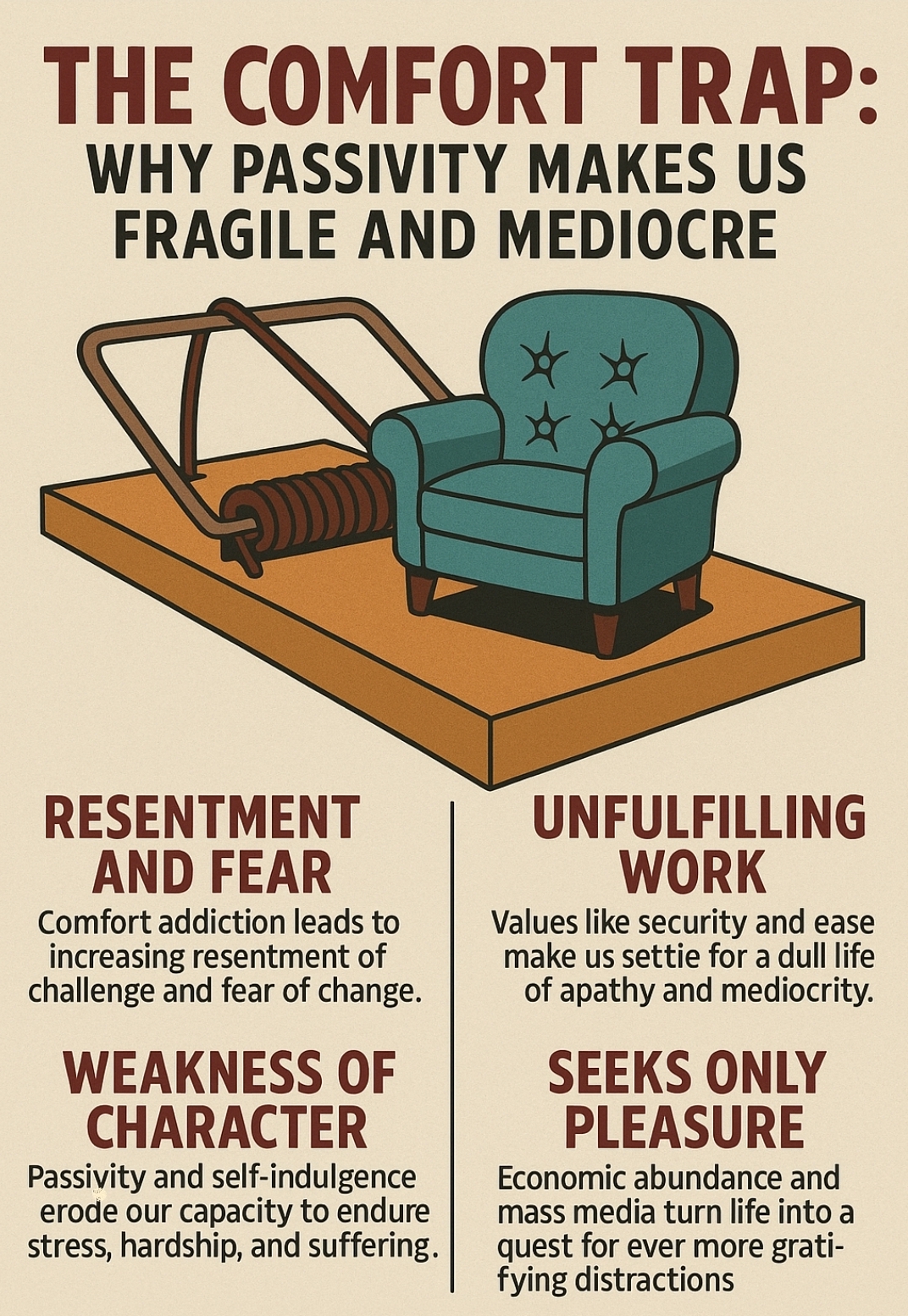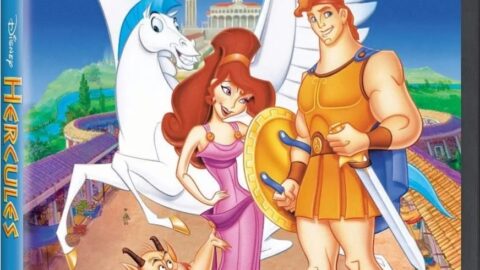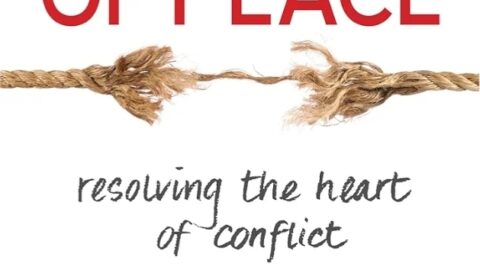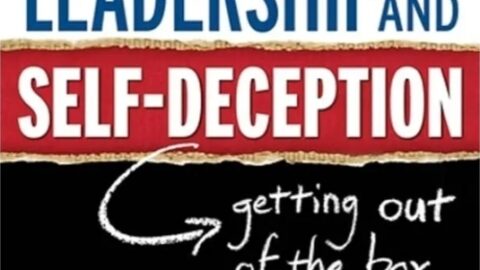The Paradox of Comfort
For the first time in human history, most people live with comforts that past kings could never imagine. Food, safety, and endless entertainment are guaranteed for the majority. Yet, alongside this abundance, we see growing apathy, boredom, and lack of purpose. Modern life freed us from survival challenges—but in doing so, it also stole our vitality.
We traded struggle for security, and in the process built a golden cage: safe, predictable, and suffocating.
From Survival to Stagnation
For millennia, daily existence demanded alertness. Our ancestors woke each morning knowing predators, disease, or hunger might kill them. That struggle forged sharpness, resilience, and pride in overcoming. Today, the dangers are gone, and the predictable routine of “wake, work, relax, repeat” has replaced adventure with monotony.
Excessive comfort weakens us. Achievements lose meaning when they require no true effort.
The Leisure Revolution and Its Curse
The industrial age changed everything. Machines gave the common worker what only nobles once had—free time. The 8-8-8 system (work, rest, leisure) promised a balanced life. Yet, entire generations didn’t know what to do with this newfound freedom.
Instead of growth, leisure was filled with passive distractions. Movies, television, games, and eventually social media consumed the hours. This created the illusion of freedom while turning free time into a graveyard for potential.
Paradoxically, more free time made us less productive. We sit in libraries filled with wisdom, but only flip through the picture books.
Entertainment as a Drug
Modern entertainment is engineered to hijack attention. Algorithms, apps, and platforms are carefully designed for addiction. The result? A society hooked on shallow, quick-hit stimuli.
Like feeding the body only sugar, constant easy entertainment rewires the brain to reject patience and depth. Reading a book, learning an instrument, or even having a deep conversation starts to feel boring. Slowly, the muscle of concentration atrophies.
The Death of Creativity
Creativity requires boredom, silence, and contemplation. But in filling every spare second with scrolling and noise, we strangle the very conditions that spark original thought.
Worse, our conversations mirror this shallowness. “How was your weekend? Did you see the game?” becomes the scratched record of daily life. Potential for deep exploration—philosophy, aspirations, meaningful fears—rots in neglect.
Identical days and empty conversations reduce life to grayscale when it could be painted in vibrant colors.
The Trap of Modern Normalcy
Today’s standard of living looks reasonable on the surface: work for bills, spend leisure on entertainment, avoid extra effort. But beneath, it is emotional quicksand.
This cycle—work, consume, rest—creates a hollow existence. Like an eagle convinced it’s too tiring to fly, many perch safely on the sidelines of life, never realizing their potential. Humans were designed to create, explore, and overcome. To live only for comfort is to waste our nature.
Passivity in Disguise
Worse still, this lifestyle masquerades as mental health. People believe avoiding effort is balance, when in truth, the mind needs challenge like a gear needs movement to avoid rust.
A stagnant mind becomes like a stagnant lake: algae grows, oxygen dies, and life withers away. So too with us—passivity breeds apathy, pessimism, and despair.
The Antidote: Effort and Creation
The cure is simple yet demanding: intentional effort. When we fill our hours with activities requiring focus—learning, building, creating—we restore vitality.
Each small victory builds confidence like bricks forming a lasting house. Unlike the fleeting pride of consumption, creation births solid pride. To write a book, plant a garden, or learn an instrument is to experience a joy no purchase or binge-watch can replicate.
The Myth of Equal Recognition
Modern culture insists everyone deserves equal recognition regardless of effort. But reality shows otherwise. Excellence comes from sacrifice, persistence, and discipline.
The piano student who practices daily will surpass the one who avoids effort. The weightlifter who embraces discomfort grows stronger than the one who stays home. Equality of opportunity exists, but excellence is earned.
This truth isn’t cruel—it’s liberating. It means results are within reach of anyone willing to pay the price.
Comfort vs. Growth: The Silent Choice
Every day we face a quiet choice: stay in the comfort zone, or embrace growth. Comfort offers predictability and safety but leaves a gnawing sense of wasted potential. Growth is uncertain, difficult, and often lonely—but it makes us the authors of our own lives instead of spectators.
To embrace growth is to climb mountains instead of circling in armchairs.
A Call to Action
Transformation begins with brutal honesty. Check your screen time. Audit your hours. How much of life is spent watching others live instead of living yourself?
Then, start replacing distractions with pursuits that awaken your inner reserves. Learn, create, build, explore. Even one hour a day changes everything.
True freedom is not empty leisure—it is the ability to use time intentionally, to build meaning instead of numbing boredom.
Conclusion
Passivity is the slow death of human potential. Comfort alone is not enough; it is the struggle, the challenge, and the creation that make life rich.
If we want to be extraordinary, we must refuse mediocrity, embrace effort, and live as creators—not consumers.
Your extraordinary life is waiting. All it asks is the courage to begin today.
Here’s a point-by-point breakdown of the transcript on why passivity makes us fragile and mediocre.
1. The Paradox of Comfort
- Humanity now enjoys unprecedented levels of comfort, safety, and abundance that even kings of the past couldn’t imagine.
- Yet, with comfort came a crisis of emptiness, apathy, and loss of purpose.
- We traded vitality for security, creating a paradox where survival is easy but meaning is scarce.
2. The Loss of Natural Challenges
- For millennia, survival challenges (predators, disease, scarcity, war) kept people sharp and purposeful.
- Modern civilization eliminated many of these struggles, creating predictable, risk-free routines.
- This safety became a “golden cage” — comfortable yet suffocating.
3. Excessive Comfort Weakens Us
- Comfort reduces resilience and strips away the joy of overcoming challenges.
- Achievements feel hollow when life is too easy.
- True pride and meaning come only through effort and overcoming difficulty.
4. The Leisure Revolution
- Industrialization created free time for the masses (8 hours work, 8 rest, 8 leisure).
- But many didn’t know how to use it — like giving a Ferrari to someone who only knows bicycles.
- Instead of growth, leisure became filled with passive entertainment (TV, movies, games, social media).
5. Entertainment as Illusion
- Industries captured free time with shallow distractions.
- This created the illusion of freedom while actually wasting the most valuable resource — time.
- More free time paradoxically led to less productivity, like owning a library but only using the picture books.
6. Addiction to Passive Stimuli
- Modern entertainment is engineered to be addictive, functioning like mental anesthesia.
- The brain atrophies when fed constant easy stimuli, making deep focus (books, instruments, meaningful conversation) feel boring.
- Instant gratification erodes appreciation for long-term rewards.
7. Boredom and the Decline of Creativity
- When boredom is numbed with endless scrolling, we kill the very conditions (silence, reflection) that fuel creativity.
- Repetition of trivial conversations and daily routines dulls thought, like swimming only at the shallow end of a pool.
- Monotony shrinks imagination, problem-solving, and vitality.
8. The Trap of “Normal Life”
- Modern normalcy = working to pay bills, then numbing oneself with entertainment.
- Culture glorifies comfort and rest as the highest goals.
- But this cycle creates an existential void: humans are designed to create, struggle, and contribute.
9. Passivity Disguised as Mental Health
- Many believe avoiding difficulty is emotional balance — but it’s the opposite.
- Without challenges, the mind stagnates like a still lake: debris (apathy, pessimism, uselessness) accumulates until vitality collapses.
10. The Antidote: Effort and Creation
- Conscious engagement with challenges (learning, building, creating) is like medicine for the mind.
- Small, consistent victories build confidence and satisfaction like bricks building a house.
- Creation gives solid, lasting pride compared to fleeting satisfaction from consumption.
11. The Myth of Equal Recognition
- A destructive modern myth is that everyone deserves equal results regardless of effort.
- Excellence requires sacrifice, discipline, and persistence — like piano practice or gym training.
- This is not oppression, but liberation: anyone willing to invest can stand out.
12. Choosing Between Comfort and Growth
- Life offers two paths:
- Comfort Zone: predictable, safe, mediocre, but leaves a gnawing sense of wasted potential.
- Excellence: uncertain, uncomfortable, sometimes isolating, but deeply fulfilling.
- Choosing growth makes one the author of life, not a passive spectator.
13. A Call to Action
- Transformation begins with an honest audit of how we spend free time (screen-time shock).
- Replace passive consumption with activities that awaken “internal reserves” (Colin Wilson).
- Dedicate at least one daily hour to skill-building, creativity, or meaningful growth.
- True freedom comes from creating, contributing, and becoming extraordinary.
Core Message:
Passivity and comfort slowly erode human vitality. To avoid mediocrity, we must re-embrace challenge, creation, and intentional effort. Only then do we achieve real freedom, purpose, and satisfaction.







